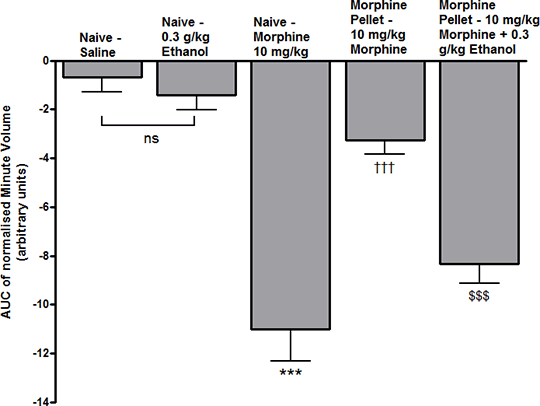Tolerance to morphine respiratory depression: Reversal by ethanol Fatal heroin overdoses are often reported to have an inverse correlation of heroin to ethanol blood content following post-mortem analysis (1); with overdoses often occurring after typically non-lethal heroin doses in experienced users (2). Ethanol has been reported to reverse morphine antinociceptive tolerance in vivo in mice (3) and so the present investigation examined the potential role of ethanol in reversing tolerance to morphine respiratory depression in mice. Respiration was measured as minute volume (MV) in freely moving male mice (CD-1) using whole body plethysmography. Animals breathed 95%air/5%CO2 to increase respiration and prevent sleep. In untreated control mice MV was 161±31 (mean ± s.d. n = 22). Tolerance to morphine was induced by subcutaneous implantation of a 75mg morphine pellet on the dorsal flank for 6 days. All challenge drugs (dissolved in saline) to naïve (un-implanted) and implanted mice were given intraperitoneally. To measure drug-induced changes in respiration MV for each mouse was normalised to pre-drug baseline and area under the curve (AUC) calculated for a 30 min post-drug period. 
Figure.1: Effect of ethanol on tolerance to morphine respiratory depression. *** (P<0.001) indicates significant difference from naïve saline and ethanol controls. ††† (P<0.001) indicates significance from naïve morphine control. $$$ (P<0.001) indicates significant difference from morphine pellet-implanted morphine-challenged group. Data shown mean ± s.e.m. A two-way ANOVA with Bonferroni’s multiple comparisons post-hoc test was used to compare groups. Ethanol (0.3 g/kg; n = 6) injected into naïve mice caused no significant depression of respiration relative to saline control (n=8) whereas morphine (10 mg/kg; n = 8) caused significant depression. After 6 days there was no difference in MV between control and morphine-pelleted animals (161±31 in control; 149±17 in morphine-pelleted animals (mean ± s.d. n=12). Morphine (10 mg/kg; n = 6) injected into morphine pellet implanted mice after 6 days caused less depression of respiration relative to naïve mice receiving the same dose. Morphine (10 mg/kg) and ethanol (0.3 g/kg) injected simultaneously in morphine pellet implanted mice (n = 6) produced a significant depression of respiration compared to pellet implanted control. These data provide evidence that ethanol reverses tolerance to morphine respiratory depression as previously observed with tolerance to morphine antinociception (3). 1. Ruttenber AJ et al, J Forensic Sci 35:891, 1990 2. Hall W & Darke S, Drug Alcohol Depend 52:71, 1998 3. Hull LC et al, J Pharmacol Exp Ther 345:512, 2013 |


